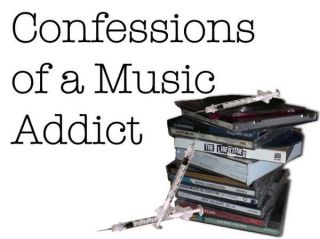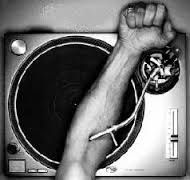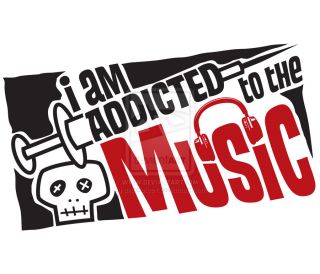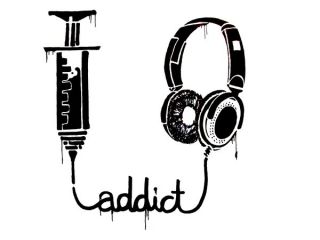“Music acts on our emotions and feelings. Drugs act on our emotions and feelings. We generally recognise that the feelings created by drugs are not ‘real’. Does the same apply to music? Is music a drug?” (Philip Dorrell, 2005; author of ‘What is Music? Solving a Scientific Mystery’)

This opening quote from Philip Dorrell is something that I have pondered many times—especially because people that know me can vouch that I am a self-confessed music obsessive. This blog is based on an article that I had published in an issue of Record Collector magazine on music mania and addiction. Although most lists of manias include ‘musomania’ (i.e., an obsession with music), there is very little in the way of academic or clinical literature on the topic. Jillyn Smith in her 1989 book Senses and Sensibilities interviewed Michael Koss (at the time, the President of the Koss Stereo Headphone Corporation. He was quoted as saying:
“The excitement that people, especially teenagers, get from high-decibel music results from activation of the peripheral nervous system by low frequency sound waves beating against the body…people can get ‘high’ from this feeling, because it switches on the body’s fight or flight mechanism, bringing a rush of adrenalin (a reason for battle music)”
There are certainly anecdotal reports of people being obsessed and/or ‘addicted’ to music’. One notorious case, is a Swedish man in his forties (Roger Tullgren) who receives state benefits from the Employment Service because of his ‘addiction’ to heavy metal music. Tullgren (with the help of three occupational psychologists) campaigned for ten years to get his condition classed as a ‘handicap’ so that he would not be discriminated against. In 2006 he claimed to have attended almost 300 heavy metal gigs and constantly missed work as a consequence. He was then sacked from his job because of his continual inability to turn up for work. With the help of psychologists, his lifestyle was subsequently classed as a disability (which in turn meant he was entitled to wage supplements). He now works at a hotel washing up and has been given a special dispensation to listen to heavy metal while he works. Other Swedish psychologists have found the ruling strange. Quoted in a Swedish newspaper, The Local, one unnamed male psychologist was reported to have said:
"I think it's extremely strange. Unless there is an underlying diagnosis it is absolutely unbelievable that the job centre would pay out. If somebody has a gambling addiction, we don't send them down to the racetrack. We try to cure the addiction, not encourage it”.
Part of me can empathize with Tullgren as I too constantly play music while I am working, and I play my i-Pod whenever I am in transit. However, my love of music has never interfered with my job, and as far as I am concerned there are no negative detrimental effects as a consequence of my excessive listening to music. However, that doesn’t mean that some people may not be addicted to music. In an online essay, Philip Dorrell explored the question theoretically and noted:
“For drugs like heroin, the notion of addiction is relatively uncontroversial…For a not-quite-so-strong drug like cocaine, it becomes less clear as to where the boundary between regular use and addiction lies. Looking at the more popular alcohol, some people get addicted to it, and some don't…There is the weaker notion of "psychological dependence", which implies that you will miss not having something, but not to the extent that you would deem yourself to be suffering. I think that might be a fair description of many people's relationship with music…So, is music a drug? The short answer is ‘yes, sort of’”.

“For drugs like heroin, the notion of addiction is relatively uncontroversial…For a not-quite-so-strong drug like cocaine, it becomes less clear as to where the boundary between regular use and addiction lies. Looking at the more popular alcohol, some people get addicted to it, and some don't…There is the weaker notion of "psychological dependence", which implies that you will miss not having something, but not to the extent that you would deem yourself to be suffering. I think that might be a fair description of many people's relationship with music…So, is music a drug? The short answer is ‘yes, sort of’”.
For Dorrell, the long answer to the question of whether music is a drug is that (theoretically) music could be considered “similar in the strength and nature of its effects to a mild recreational drug” because (i) it generates ‘false’ feelings, (ii) the maximum level of effect is roughly equivalent to a couple of ‘standard’ alcoholic drinks, (iii) it is not strictly addictive, but may cause psychological dependence, and (iv) excessive consumption can cause some health problems.
I have operationally defined addictive behaviour as any behaviour that features what I believe are the six core components of addiction (i.e., salience, mood modification, tolerance, withdrawal symptoms, conflict and relapse). I argue that any behaviour (e.g., excessive listening to music) that fulfils these six criteria can be operationally defined as an addiction. Theoretically, and in relation to “music addiction”, the six components would therefore be:
• Salience – This occurs when music becomes the single most important activity in the person’s life and dominates their thinking (preoccupations and cognitive distortions), feelings (cravings) and behaviour (deterioration of socialised behaviour). For instance, even if the person is not actually listening to music they will be constantly thinking about the next time that they will be (i.e., a total preoccupation with music).
• Mood modification – This refers to the subjective experiences that people report as a consequence of listening to music and can be seen as a coping strategy (i.e., they experience an arousing ‘buzz’ or a ‘high’ or paradoxically a tranquilizing feel of ‘escape’ or ‘numbing’).
• Tolerance – This is the process whereby increasing amounts of listening to music are required to achieve the former mood modifying effects. This basically means that for someone engaged in listening to music, they gradually build up the amount of the time they spend listening to music every day.
• Withdrawal symptoms – These are the unpleasant feeling states and/or physical effects (e.g., the shakes, moodiness, irritability, etc.) that occur when the person is unable to listen to music because they are without their i-Pod or have a painful ear infection.
• Conflict – This refers to the conflicts between the person and those around them (interpersonal conflict), conflicts with other activities (work, social life, other hobbies and interests) or from within the individual themselves (intra-psychic conflict and/or subjective feelings of loss of control) that are concerned with spending too much time listening to music.
• Relapse – This is the tendency for repeated reversions to earlier patterns of excessive music listening to recur and for even the most extreme patterns typical of the height of excessive music listening to be quickly restored after periods of control.

I have also argued that the temporal dimension and context of the addiction needs to be taken into account. With regard to the temporal dimension, most people can think of periods in their lives when listening to music has taken over for a short time (e.g., listening to music 12- to 16-hour days for a month). This alone does not mean that such people are addicted to listening to music. To be genuinely addictive, the activity must be something that has been sustained and have been going on over a long period of time. The difference between a healthy excessive enthusiasm and an addiction is that healthy excessive enthusiams add to life whereas addiction takes away from it.
Most recently, a 2011 study published in Nature Neuroscience reported that on a neurochemical level, the pleasurable experience of listening to music releases the neurotransmitter dopamine that is important for the pleasures associated with rewards such as food, psychoactive drugs and money. This led to many headlines in newspapers along the lines of “people who say that they are ‘addicted’ to music are not lying”.
In their study, Dr. Valorie Salimpoor and her colleagues (at Montreal’s McGill University in Canada), measured dopamine release in response to music that elicited "chills". Participants in their experiments were asked to listen to their favourite songs while their brains were being observed using a neuro-imaging technique known as Position Emission Tomography (PET). They found that changes in heart rate, skin conductance, temperature, and breathing, were correlated with how pleasurable the music was. Furthermore, their findings suggested that dopamine release was greater for pleasurable music when compared to “neutral” music. In newspaper interviews, Dr Salimpoor said:
“Dopamine is important because it makes us want to repeat behaviors. It’s the reason why addictions exist, whether positive or negative. In this case, the euphoric ‘highs’ from music are neurochemically reinforced by our brain so we keep coming back to them. It’s like drugs. It works on the same system as cocaine. It’s working on the same systems of addiction, which explain why we’re willing to spend so much time and money trying to achieve musical experiences. This is the first time that we’ve found dopamine release in response to an aesthetic stimulus. Aesthetic stimuli are largely cognitive in nature. It’s not the music that is giving us the ‘rush.' It’s the way we’re interpreting it”.

“Dopamine is important because it makes us want to repeat behaviors. It’s the reason why addictions exist, whether positive or negative. In this case, the euphoric ‘highs’ from music are neurochemically reinforced by our brain so we keep coming back to them. It’s like drugs. It works on the same system as cocaine. It’s working on the same systems of addiction, which explain why we’re willing to spend so much time and money trying to achieve musical experiences. This is the first time that we’ve found dopamine release in response to an aesthetic stimulus. Aesthetic stimuli are largely cognitive in nature. It’s not the music that is giving us the ‘rush.' It’s the way we’re interpreting it”.
The team also reported that just the anticipation of pleasurable music led to increased dopamine release. Therefore, this helps explain why individuals (like myself) continually repeat songs or albums all the time as we want to re-experience those sensations repeatedly.
References and further reading
Dorrell, P. (2005). Is music a drug? 1729.com, July 3. Located at: http://www.1729.com/blog/IsMusicADrug.html
Dorrell, P. (2005). What is Music? Solving a Scientific Mystery. Located at: http://whatismusic.info/.
Griffiths, M.D. (2012). Music addiction. Record Collector, 406 (October), p.20.
The Local (2007). Man gets sick benefits for heavy metal addiction. June 19. Located at: http://www.thelocal.se/7650/20070619/
Morrison, E. (2011). Researchers show why music is so addictive. Medhill Reports, January 21. Located at: http://news.medill.northwestern.edu/chicago/news.aspx?id=176870
Salimpoor, V.N., Benovoy, M., Larcher, K. Dagher, A. & Zatorre, R.J. (2011). Anatomically distinct dopamine release during anticipation and experience of peak emotion to music. Nature Neuroscience, 14, 257–262.
Smith, J. (1989). Senses and Sensibilities. New York: Wiley.




